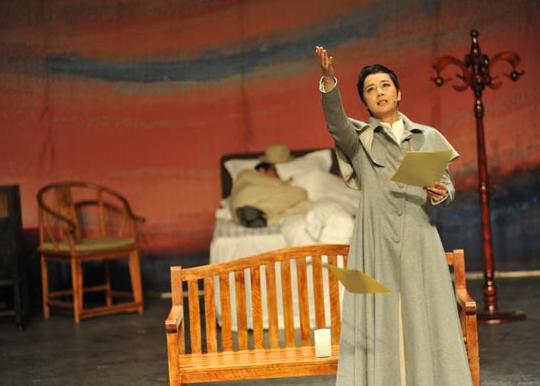

The Seagull, one of the quartet of great Chekhov theater pieces, is much less accessible. To someone not familiar with theatrical conventions, it may appear placid, devoid of dramatic tension. It is full of ostensibly inconsequential chatter while whatever little drama that remains is pushed off the stage, such as the travail of the ingenue and the suicide of the aspiring writer.
The Seagull has been staged in China many times, most notably in 1991 by the Beijing People's Art Theater. A Russian director was hired for the job and a who's-who in China's showbiz was cast, including then budding and now marquee names like Pu Cunxin and Xu Fan as Konstantin and Nina respectively. It was not at all different from the style we associate with this pantheon of theatrical arts partly because it was initially built on the Soviet model anyway.
In 2013, Shanghai Dramatic Arts Center hired Russian director Adolf Shapiro for a production of Uncle Vanya. He was claimed to be a "true descendent" of the Stanislavski school of theatrical style. The irony is, you'll find plenty of proof in the biographical play I Take Your Hand in Mine that Chekhov was often not satisfied with Stanislavski's treatment in the first place.
The Russian artists may have brought more authenticity, but it takes a special genius to distill the exquisiteness of Chekhov. Lai demonstrated a stroke of that genius by placing the story of The Seagull in a 1930s Shanghai suburb. Yet, every line of the original play is preserved-even some dialogue that sounds like translations from a foreign language.
For those not familiar with Russian history or literature, the essence of the play, especially its nuances and tone, begins to surface. What used to appear as outlandish now makes perfect sense. The undertones are no longer totally lost.
Prior to this production, The Seagull received a dramatically revised treatment from Yang Shen, who, in 2009, put on a small-theater version to mock China's theater scene and those who dream of squeezing into the circle. It was considered a personal statement couched in a Chekhov classic.
In China, Chekhov is to be read rather than to be staged. His fiction has gained a wide following, but his plays are more venerated than embraced. Three Sisters and Uncle Vanya were presented in Beijing as early as the 1950s, and The Seagull in the 1980s. "There were not many people in the audience and more than half of them left during the intermission," recalls Tong Dao-ming, a theater scholar, critic and translator.
But among the limited coterie of fans was Cao Yu, China's indisputable master of theater. After reading Three Sisters, he wrote, in 1935: "A play as great as this, yet with no pretentious interludes, only living souls walking in and out, features people with souls, not dramatic moments. The structure is quite flat and there's no narrative upheaval, but it grips my heart and soul, almost halting my breathing. I was lost in the melancholia. How I want to be a humble student to this teacher Chekhov."
During the "cultural revolution" (1966-76), poet Liu Shahe had to burn his collection of Chekhov books, lamenting: "I cannot keep you/I cannot hide you. Tonight I send you to the oven. Farewell, Chekhov. You, with a mustache and glasses, are smiling at me/Me, I'm crying at the smoke evaporating and the light vanishing/Farewell, Chekhov!"
Fast forward to 2004, the "Year of Chekhov" as declared by UNESCO. China ran a monthlong program of Chekhov plays, including touring productions from Israel and Canada. A Russian edition of The Cherry Orchard was presented back-to-back with a Chinese production, directed by the venerated Lin Zhaohua and starring Jiang Wenli, a luminary on the big and small screens as well as the stage. (In 1998, Lin merged Three Sisters with Samuel Becket's Waiting for Godot for the Beijing audience.)
This time, Jiang is playing Olga, who gets to reprise tiny portions of her role in The Cherry Orchard and other plays. By "her role", I mean Jiang's role as well as Olga's role.
"Chekhov is not very accessible. Those who truly understand him will find that he was avant-garde, even more so when we look back 100 years from his era," says Lai, who was immersed in Chekhov when he was studying for his PhD at the University of California at Berkeley. "Today's avant-garde pales next to him. They are imitating the facade, but Chekhov is a pioneer in dramatic structure. You'd have to step back to see the beauty of it."
Russian opera makes a comeback
2014-03-14Comedy ‘The Seagull‘ to debut in Beijing
2014-03-13Copyright ©1999-2018
Chinanews.com. All rights reserved.
Reproduction in whole or in part without permission is prohibited.